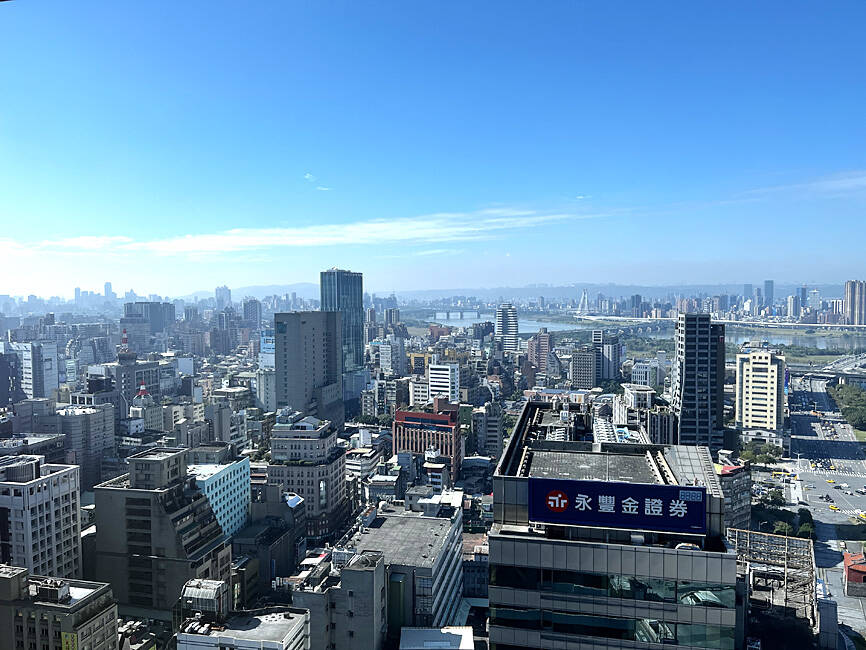Housing transactions in the six special municipalities totaled 63,226 units in the first quarter, rising 28.3 percent from the same period last year, as the market emerged from unfavorable policy measures and continued to benefit from government interest subsidies for first-home purchases, analysts said on Monday.
The results also came as concerns over a ban on transfers of presale project purchase agreements faded and rallies in the TAIEX boosted sentiment, Sinyi Realty Inc (信義房屋) research manager Tseng Ching-der (曾敬德) said.
The subsidies for first-home purchases drove one-third of overall transactions in the first quarter, Tseng said.

Photo: Hsu Yi-ping, Taipei Times
The subsidy program has expedited transactions since its launch in August last year by providing ultra-low interest rates of 1.775 percent, a five-year grace period and mortgage durations capped at 40 years, he said.
Tseng said that the boom is expected to continue through the first half, despite the central bank’s rate hike last month of 0.125 percentage points to curb inflation expectations ahead of an average 11 percent increase in electricity rates from this month.
The interest rate hike would not affect the program, as the Ministry of Finance has said it would absorb extra borrowing costs to help stabilize prices.
Tainan reported the steepest hike in housing deals of 39.2 percent to a record 6,865 units in the first quarter, as the city continued to benefit from relative home affordability and capacity expansions by major local tech firms, Sinyi Realty said.
Transactions in Kaohsiung soared 30 percent to 10,435 units for similar reasons after Taiwan Semiconductor Manufacturing Co (台積電) said it plans to set up new plants in the city.
The pickup in confidence also has to do with Taiwan’s improving economy and exports, Evertrust Rehouse Co (永慶房屋) said.
The government’s business climate monitor flashed “green” in the past two months, indicating steady economic growth, Evertrust Rehouse deputy research head Chen Chin-ping (陳金萍) said.
The signal came after exports rebounded to expansion mode and would give local firms confidence to invest and upgrade, boding well for consumer spending, Chen said.
Housing transactions in Taipei rose 35 percent to 7,641 units and were up 21 percent to 15,092 units in New Taipei City, while Taoyuan had a 35 percent increase to 8,190 units and Taichung posted a 22 percent gain to 12,130 units, government data showed.
The latest transaction data indicated that first-quarter growth momentum in the housing market was even and broad-based, H&B Realty Co (住商不動產) said.
However, the central bank’s recent rate hike was aimed to tell the market that it remains watchful, Chinatrust Real Estate Co (中信房屋) said.

SELL-OFF: Investors expect tariff-driven volatility as the local boarse reopens today, while analysts say government support and solid fundamentals would steady sentiment Local investors are bracing for a sharp market downturn today as the nation’s financial markets resume trading following a two-day closure for national holidays before the weekend, with sentiment rattled by US President Donald Trump’s sweeping tariff announcement. Trump’s unveiling of new “reciprocal tariffs” on Wednesday triggered a sell-off in global markets, with the FTSE Taiwan Index Futures — a benchmark for Taiwanese equities traded in Singapore — tumbling 9.2 percent over the past two sessions. Meanwhile, the American depositary receipts (ADRs) of Taiwan Semiconductor Manufacturing Co (TSMC, 台積電), the most heavily weighted stock on the TAIEX, plunged 13.8 percent in

A wave of stop-loss selling and panic selling hit Taiwan's stock market at its opening today, with the weighted index plunging 2,086 points — a drop of more than 9.7 percent — marking the largest intraday point and percentage loss on record. The index bottomed out at 19,212.02, while futures were locked limit-down, with more than 1,000 stocks hitting their daily drop limit. Three heavyweight stocks — Taiwan Semiconductor Manufacturing Co (TSMC, 台積電), Hon Hai Precision Industry Co (Foxconn, 鴻海精密) and MediaTek (聯發科) — hit their limit-down prices as soon as the market opened, falling to NT$848 (US$25.54), NT$138.5 and NT$1,295 respectively. TSMC's

TARIFFS: The global ‘panic atmosphere remains strong,’ and foreign investors have continued to sell their holdings since the start of the year, the Ministry of Finance said The government yesterday authorized the activation of its NT$500 billion (US$15.15 billion) National Stabilization Fund (NSF) to prop up the local stock market after two days of sharp falls in reaction to US President Donald Trump’s new import tariffs. The Ministry of Finance said in a statement after the market close that the steering committee of the fund had been given the go-ahead to intervene in the market to bolster Taiwanese shares in a time of crisis. The fund has been authorized to use its assets “to carry out market stabilization tasks as appropriate to maintain the stability of Taiwan’s

In a small town in Paraguay, a showdown is brewing between traditional producers of yerba mate, a bitter herbal tea popular across South America, and miners of a shinier treasure: gold. A rush for the precious metal is pitting mate growers and indigenous groups against the expanding operations of small-scale miners who, until recently, were their neighbors, not nemeses. “They [the miners] have destroyed everything... The canals, springs, swamps,” said Vidal Britez, president of the Yerba Mate Producers’ Association of the town of Paso Yobai, about 210km east of capital Asuncion. “You can see the pollution from the dead fish.